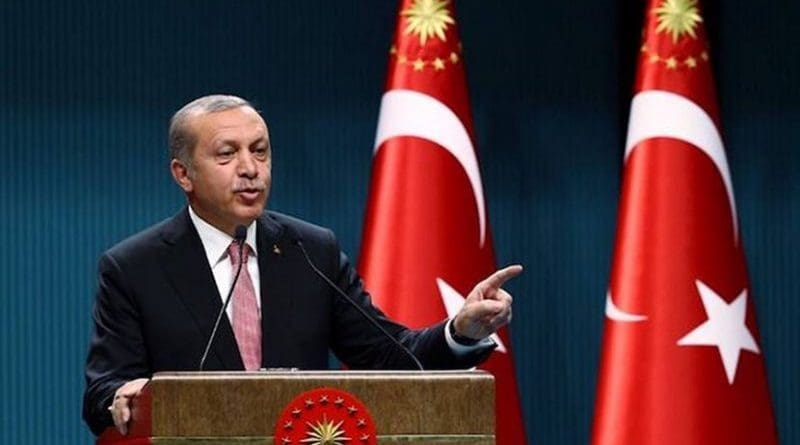How Erdogan’s Maneuvers In The Med Have Roots A Century Old – OpEd
By Arab News
By Cornelia Meyer*
A little over a century ago, the Sykes-Picot agreement defined the spheres of influence of European powers in the remnants of the Ottoman Empire. At the end of the First World War, further agreements drew new borders and asserted the geopolitical and geo-economic interests of Western countries in what we now know as the Middle East. It was the twilight of the Ottomans, the “high noon” of European influence and the dawn of a newly confident US. The decisions taken then still resonate today.
The region has not become safer. The so-called “Arab Spring” morphed into unrest and civil conflict. This century alone there has been war in Iraq, civil war in Syria, the disintegration of Libya into a failed state, and the rise and fall of Daesh (we still do not know how it will re-emerge). Meanwhile myriad Islamist terrorist groups exert influence from Mali to Iraq.
This is the historical backdrop against which to understand the maneuvering of various powers in the eastern Mediterranean.
Turkey is at odds with the US and its other NATO allies over the purchase of Russia’s S-400 air defense system and its military incursions into northern Syria. The EU criticizes Turkey’s human-rights record and lack of a free press, but Europe needs Turkey to contain the flood of refugees from Syria and elsewhere.
Turkey already houses 3.6 million Syrian refugees, an intolerable strain on its struggling economy. With more than 200,000 having fled the latest offensive in Idlib by Assad regime forces and Russian air power, Turkish President Recep Tayyip Erdogan has threatened to reopen the border with Greece — spooking German Chancellor Angela Merkel into planning a trip to Ankara next month.
Now Erdogan has said he may send troops to support the internationally recognized Libyan government of Fayez Al-Sarraj in Tripoli. This will pitch Turkey directly against Russia, Egypt and several Gulf states, who support rival leader Khalifa Haftar in Tobruk. The US and Europe look with great unease at Libya, which still is under a UN arms embargo that nobody seems to observe.
Erdogan clearly has his hands full, so what prompted him to broaden his military activities into Libya? The answers are natural resources and refugees.
The discovery of natural gas has made the eastern Mediterranean seafloor valuable real estate. An emerging alliance between Cyprus, Greece, Israel and Egypt is trying to develop these reserves, and agreement on a pipeline is expected early next year. Ankara views all this as a provocation, and engagement in a Mediterranean country equally rich in oil and gas may be seen as a countermeasure.
Moreover, the southern Mediterranean is the first step to Europe for refugees from Africa, and Erdogan sees an opportunity to strengthen his position by influencing the flow, simultaneously exposing Europe’s weakness and disunity in its own Libya policy; a proposed peace conference in Berlin has failed to progress beyond the planning stages. While most European nations have avoided declaring clear alliances, Italy, Libya’s former colonial power, leans toward Al-Sarraj, while France’s President Emmanuel Macron prefers Haftar.
Russia and the US have their own interests, but whichever side anyone supports in Syria or Libya, the situation is dangerous. Norbert Roettgen, head of the German parliament’s select committee on foreign affairs, has compared Syria — the involvement of so many state and non-state participants along with great powers — to the Balkans just before the First World War; he fears that one wrong step could be the source of another global conflict. This may err on the side of pessimism, but we should not underestimate the potential for a single military mistake to escalate irretrievably. In that context, Turkey’s move into Libya has made the situation in the eastern Mediterranean neither clearer nor safer. What we need is diplomacy and efforts to rebuild war-torn areas, not more military involvement. While heads of state worry about their geopolitical position in relation to each other, civilians continue to be exposed to untold suffering.
Messrs. Sykes and Picot have a great deal to answer for. A century on, we should be more enlightened, and look for solutions rather than new opportunities for confrontation. At the dawn of a new decade, we should be allowed to hope, or even dream.
*Cornelia Meyer is a business consultant, macro-economist and energy expert.


Erdogan is a Zionist Muslim with an agenda consistent with US imperialism’s goals. Erdogan tries to enlarge his country to establish a new Othman empire. Erdogan and his scholars always claim that all Arab countries are their land. And they thank that it is the time to enter Iraq and North Africa.
This plan if it is achieved means that US imperialism and Israel will control all the land with Erdogan. Three of them will share the properties and the loots. This is Erdogan’s Dream.
To achieve his plan he is using his terrorists of Daesh and AL-Nusra (AL-Qaeda). Currently, he has been reallocating to Iraq, Syria, Misr, and Libya. US imperialism knows and watches what Erdogan is doing and seems it likes it. Trump always provides supports to Erdogan when he attacks Syria for “war crimes” in Idlib. Simply, because Idlib is the hub of Erdogan’s terrorists.
Eventually, Erdogan will lose and so will his imperialist allies. People should understand why many resistance forces are being established to defend their people and land from the imperialist and the Othman domination.
Trump and Erdogan should leave the Arabs living in peace, because peace is good for the world economy. But peace means losses to American Military Industrial Complex.